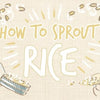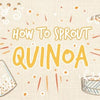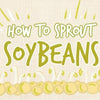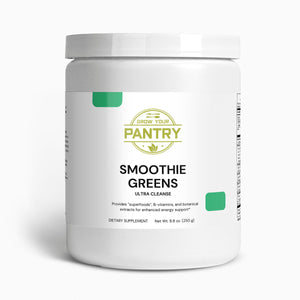Broccoli Sprouts Vs Alfalfa Sprouts: The Comparisons
Broccoli sprouts and alfalfa sprouts are often confused, for their look, health benefits, growing habits and nutrients. After many questions, we’re going break down the specific differences between broccoli and alfalfa sprouts, including the so you can get the most out of them.
Not Much Time? Skip To What You'd Like To Learn...
-
What Are Broccoli Sprouts?
-
What Are Alfalfa Sprouts?
-
Broccolis Sprouts Vs Alfalfa Sprouts Taste And Appearance
-
Health & Nutrient Benefits Of Each
-
How To Grow
-
How To Store
-
Which Contains More Sulforaphane
-
Specific Diets, Broccoli And Alfalfa Sprouts
-
Common Questions
What Are Broccoli Sprouts?
Broccoli sprouts are the shoots that grow out of the broccoli seeds. They’ve been popularised in the past decade by research into the health effects of broccoli sprouts - being packed with vitamins, minerals, antioxidants and nutrients.They have a thin white shoot and a green tip.
Broccoli sprouts are super easy to grow, only taking 3-4 days, making them perfect for home growers. These healthy snacks are now also found in a lot of health stores, asian supermarkets and grocery stores too.
What Are Alfalfa Sprouts?
Alfalfa sprouts grow from the alfalfa beans. Alfalfa is characterized as both a legume as well as a herb, and has been used medicinally for hundreds of years. Although fabled for it’s healing and health properties it’s only now starting to be studied medically.
Just like broccoli sprouts, alfalfa sprouts can grow rapidly too, only taking a few days. Alfalfa sprouts are a little less common to find in grocery stores, making sprouting the easiest and cheapest way to get your alfalfa sprout fix.
Broccolis Sprouts Vs Alfalfa Sprouts Taste And Appearance

Although both types of sprouts may look the same they certainly don’t taste the same! We’ll quickly guide you through the main differences when eating.
Texture - The texture of both types of sprouts are crunchy and will snap when biting into them. Just like all sprouts they have a very high percentage of water in them.
Flavor - Broccoli sprouts and alfalfa sprouts taste distinctly different. Broccoli sprouts have a mustard or rashish flavor which is the perfect way to dress a salad. Alfalfa sprouts on the other hand are more mild, and nutty in flavor.
Cooking - Both broccoli sprouts and alfalfa sprouts are too delicate to cook. If added to a stir-fry or dish they will lose the crunchy texture and melt into it. It’s recommended to add a handful of sprouts to your smoothie, sandwich or salad.
Appearance - They look almost identical. Even when up close they both have the same characteristic white shoot and green leaves on top. The best way to tell them apart is to grab a few and bite them! Their taste gives it away immediately.
Depending on your own palette and preferences you should decide which type of sprouts are for you based on whether you prefer mustard tasting notes or nutty flavors.
Health & Nutrient Benefits Of Each
Both varieties of sprouts are packed with vitamins and minerals, which can contribute to improved health too.
5 Health Benefits Of Broccoli Sprouts
Most of the popularly cited health benefits of broccoli sprouts come from the active compound called sulforaphane. Sulforaphane research is still in its infancy, and is not FDA approved for treating any medical condition. [Warning: If you have a medical condition or suspect contact your physician immediately, before changing your diet.]
Reduced Cholesterol - A study found that by following a diet high in cruciferous vegetables have been shown to reduce levels of plasma LDL (cholesterol). Cruciferous vegetables include those in the broccoli family. For more information check the study out here: NCBI.com.
Improve Liver Conditions - For two months broccoli sprout extract was given to men with hepatic abnormalities. After 2 months they found that they had significantly lower levels of stress and oxidation markers from the liver. Showing that a supplement with sulforaphane may be helpful with combating certain liver issues. The full study can be found here: NCBI.com.
Helps Asthma - A study using animals concluded that by consuming sulforaphane it inhibited an immune response in asthma. The studies in humans are inconclusive and have not proven this. This would be a fascinating development in asthma treatment after more studies have been conducted. For the full research check it out here: NCBI.com.
Reduces Chronic Inflammation - The sulforaphane has been shown to reduce chronic inflammation in human studies. After consuming sulforaphane the biomarkers which indicate inflammation were reduced. For the full study check it out here.
Reduce Brain Swelling - Following brain damage the brain may become swollen. When excess fluid is stored on the brain post accident then it will become enlarged. Using a rodent model it found that the swelling was less if they consumed cruciferous vegetables. Check out the fascinating study here: onlinelibrary.com.
5 Health Benefits Of Eating Alfalfa Sprouts
Alfalfa sprouts are packed with high concentrations of vitamins and minerals. Each of which have a different impact on your health. We’ll breakdown the most common ones and explain their powerful health benefits.
Vitamin K - Alfalfa sprouts are high in vitamin K, one cup (33g) will give you 13% of your daily requirement! which helps to anti-calcify your body, has anticancer benefits, and supports strong bones. For more information about Vitamin K’s proven benefits check them out here.
Vitamin C - One cup of alfalfa sprouts will give you 5% of your daily vitamin C requirement. Vitamin C is important in maintaining connecting tissue, bone formation, wound healing and a healthy gut. Sources: Vitamin C Health Benefits, Vitamin C Content In Alfalfa Sprouts,
Lower Blood Glucose - Diabetics suffer from erratic and often high blood glucose levels. A study by a team in Pakistan concluded that bean sprouts help to lower blood glucose levels and also help to treat diabetes too. The study can be found here: Blood Glucose And Alfalfa Sprouts.
Source Of Fiber - Fiber helps to regulate bowel movements as well as maintain bowel health too. For more health benefits of eating food high in fiber check out the Mayoclinic. The average serving of alfalfa sprouts will contain 3-5% of your daily requirements (fiber percentage source).
Helps To Support Weight Loss - Alfalfa sprouts are very low in calorie density, making them an ideal snack for those looking to shed extra lbs. They contain 7.6 calories per serving. Serving ideas are to add them into salads, sprinkle on top of sandwiches, or just dig into them as a crunch snack.
How To Grow

Growing all types of sprouts is very simple, quick and cheap too. All sprouts also follow the same method of sprouting too. There are hundreds of online blog posts and videos detailing how to grow all types of sprouts - we’ll keep this guide simple and to the point.
Here Is A Quick Generic Method:
Equipment:
-
Seeds, or legumes of choice
-
Sprouting jar or vessel
Instructions:
1. Soak your seeds or legumes for 6-8 hours
2. Drain your jar of vessel
3. Thoroughly wash your sprouts 2-3 times per day
4. After rinsing be sure to make sure they’re dry
5. Repeat the rinsing process for 3-5 days
6. When fully sprouted rinse and store
Which Is Easier To Grow?
There is little to no difference when sprouting broccoli and alfalfa seeds. The method is exactly the same for sprouting both broccoli and alfalfa.
Which Is Faster To Grow?
Broccoli sprouts typically take between 3-4 days to fully sprout. Whereas alfalfa would normally take 4-5 days. There is very little difference, and depending on the environment will be ready in almost the same time too.
Which Is Cheaper?
The biggest expense when sprouting is the cost of the seeds or beans. However, as you only need very few seeds to grow many sprouts, the final cost is very inexpensive too. The recommended sprouting quantity of seeds is normally one oz per vessel or jar, to ensure not over packing. Therefore we will compare prices in oz.
Broccoli Seeds
Brand - Food To Live
Price - $16.49
Quantity - 8oz
Overview: Broccoli sprouts are simple and easy to sprout, also they are packed with sulforaphane which has a wide array of purported health benefits.The source of the seeds is very high quality, making them safe to sprout and consume. They also have a very high sprouting success rate, and good value for money too. Making them the #1 pick for broccoli sprouting seeds.
Check The Latest Price Here
Alfalfa Seeds
Brand - The Sprout House
Price - $19.99
Quantity - 1lb
Certificates - Non-GMO, Organic
Overview - Alfalfa sprouts are perfect for adding to your salad, smoothie or as a crunchy sandwich filler too. These sprouts are high quality, and have great feedback too. The sprout house are a trusted name in the sprouting industry, and have a good sprouting success rate too.
Check The Latest Price Here
How To Store
Storing all types of sprouts is necessary in order to keep them crunchy, healthy and mold free for long periods of time. As all sprouts and shoots are so similar in structure and type that you can use the same method for storage - although the amount of time you can store them for will vary.
The most common methods for storing sprouts is in the refrigerator, freezer or even in an ice bucket. Each has their own pros and cons.
Fridge |
Freezer |
Ice Water |
|
Alfalfa Sprouts |
2-3 Days |
0 |
2 Days |
Broccoli Sprouts |
2-4 Weeks |
3 Months |
2 Days |
How Long Can I Store My Sprouts For?
Which Lasts Longer?
Broccoli Sprouts - If you thoroughly wash, rinse and store broccoli sprouts they should last for between 2-4 weeks when stored correctly, in the fridge. In the freezer they’re good for 3 months, without losing too much of their taste. You can eat them up to one year after storage although this isn’t recommended.
Alfalfa Sprouts - Alfalfa sprouts have a very short shelf life. They will only be good in the fridge for a few days. Ideally, like all sprouts, you should consume the same day you pick or buy them. It is not recommended to freeze alfalfa sprouts as it will dramatically compromise the quality.
Which Contains More Sulforaphane
Sulforaphane is a compound that is found in the cruciferous vegetable family. Vegetables such as broccoli, brussel sprouts and cabbages are part of the cruciferous family. Sulforaphane has become a lot more popular in health circles for all of the purported health benefits. A lot of which haven’t yet had enough research conducted for trials and none of which are FDA approved.
Broccoli sprouts, being part of the cruciferous vegetable family contain a high concentration of sulforaphane. Freezing broccoli sprouts will increase the quantity of sulforaphane by two fold. If you’re eating the sprouts for the purported health benefits be sure to freeze them!
Alfalfa sprouts are not part of the cruciferous vegetable family and therefore do not contain any sulforaphane. Although they also contain a lot of vitamins, nutrients and health benefits they are not the same as broccoli sprouts.
Specific Diets, Broccoli And Alfalfa Sprouts
Broccoli and alfalfa sprouts are suitable to be consumed on many different types of specialised diets. They include: Atkins diet, Ketogenic diet, and paleo diet, among many others. As most of these diets prohibit the consumption of legumes, be sure to peel away the legume from the sprout only consuming the shoot.
Common Questions
Are Broccoli Sprouts And Alfalfa Sprouts The Same?
No, each type of sprout comes from their respective seed, legume, grain or nut. Broccoli sprouts come from broccoli seeds and alfalfa sprouts come from the alfalfa legume. Meaning they have different tastes, slightly different textures, and flavors.
How Much Broccoli Sprouts Should You Eat Per Day?
When starting to eat a new food it’s generally recommended to start with a small portion - no more than 100g per day - (Source: Dr. Rhonda Patrick). If this is part of a radical diet overhaul then consult your physician first.
Do Alfalfa Sprouts Have Sulforaphane?
No, alfalfa does not contain any sulforaphane. In fact it’s often used as a placebo when testing the effect of broccoli sprouts in trials.
Why Are Alfalfa Sprouts Dangerous?
Alfalfa sprouts can be considered dangerous due to often being eaten raw, after sprouting. Sprouts have a high risk of foodborne bacteria and disease.
How Do You Eat Sprouts Safely?
The safest way to consume sprouts is to regularly and thoroughly wash them, and then cook them. Cooking sprouts will raise the temperature which kills harmful bacteria.
What Are The Healthiest Sprouts To Eat?
All sprouts are vegetables and therefore packed with goodness. Often people will start eating a certain type of sprout as they contain certain nutrients that purportedly help a medical condition. Therefore this question is very subjective, although health conscious people are currently promoting the consumption of broccoli sprouts.
Should You Wash Broccoli Sprouts?
Yes, you should always wash broccoli sprouts, in the same way you wash all vegetables before eating.
Does Freezing Broccoli Sprouts Kill Bacteria?
Freezing food is not a recommended method for killing bacteria, as may not be cool enough. It’s recommended to boil or blanch food to kill bacteria.
Does Cooking Broccoli Sprouts Destroy Nutrients?
Yes by heating broccoli sprouts, and all vegetables it’s likely to kill bacteria. A study published by Agriculture And Food Chemistry found that vitamin C will decrease content will reduce by 15-55% and fat soluble nutrients are best preserved when steamed.
Are Broccoli Sprouts Dangerous?
Because broccoli sprouts are grown in jars that may contain water residue and are in a warm environment then they’re prone to bacteria and mold growth. If you’re buying them make sure to source them from a reputable brand or supplier, to ensure high health standards.
Are Broccoli Sprouts Safe To Eat Raw?
If you have lower immunity due to health issues, age related or pregnancy it’s recommended to avoid eating raw bean sprouts. If you chose to eat raw bean sprouts, check the suppliers credentials and recommendations before eating raw.
Does Freezing Broccoli Sprouts Increase Sulforaphane?
When freezing broccoli sprouts, the sulforaphane can increase by up to 2 times! For a quick guide to freezing check out our guide: How To Freeze Sprouts.
Can You Eat Too Many Broccoli Sprouts?
Just like all foods, it’s possible to consume too many. Stick to the recommended serving sizes if you’re new to eating them.
Do Broccoli Sprouts Get Moldy?
Yes, broccoli sprouts are prone to becoming moldy. They’re often stored in damp and warm conditions, making them a breeding ground for bacterial growth. Be sure to store correctly, for a guide to know when your sprouts have gone bad check out: Have My Sprouts Gone Bad?









